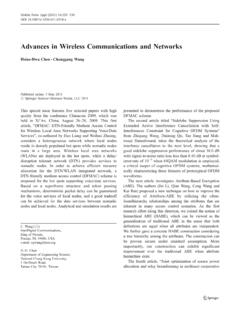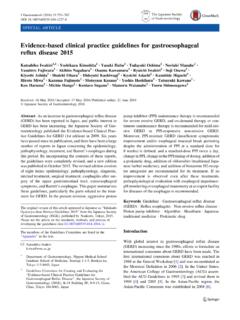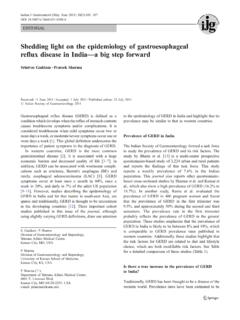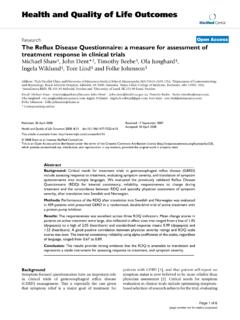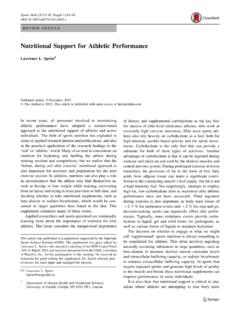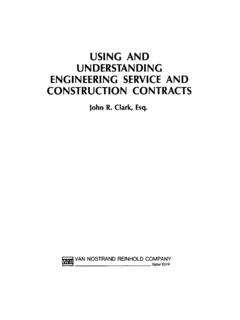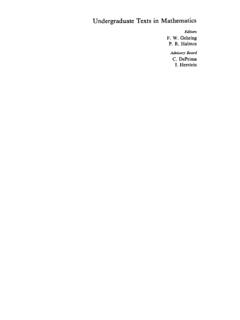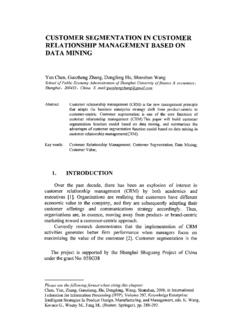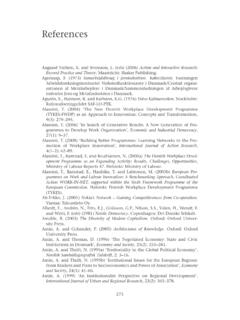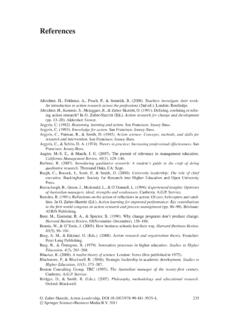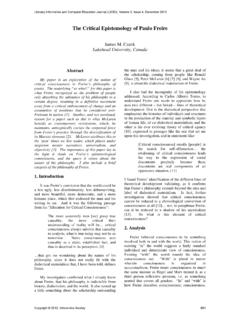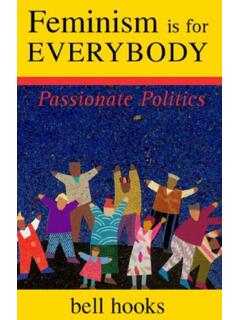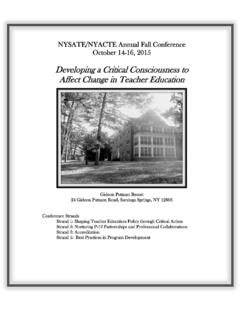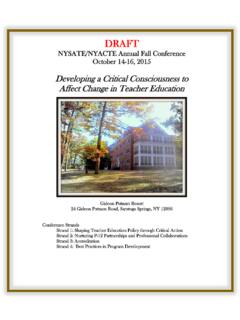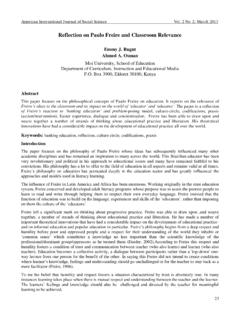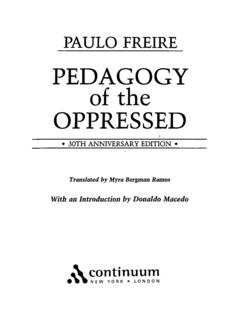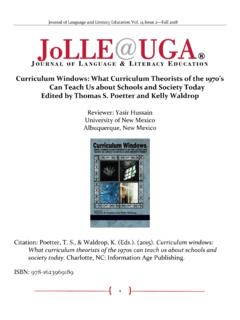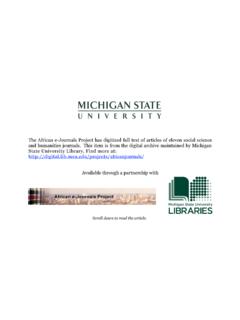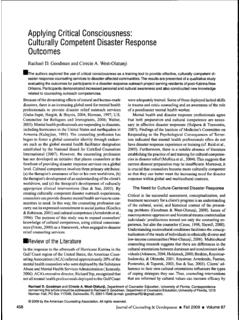Transcription of Using critical consciousness to inform health professions ...
1 REVIEW ARTICLEDOI Med Educ (2017) 6:12 20 Using critical consciousness to inform health professions educationA literature reviewMark Halman1 Lindsay Baker2 Stella Ng2 Published online: 3 January 2017 The Author(s) 2016. This article is available at SpringerLink with Open explore how, in health professions education (HPE), the concept of critical consciousness has been de-fined and discussed, and to consider and suggest how criti-cal pedagogy could be applied in practice. This explorationresponds to increasing calls inthe literature for HPE to fos-ter compassionate care and social consciousness throughthe social sciences and authors searched Medline/PubMed, ERIC andWeb of Science for articles focusing on critical conscious-ness and/or critical pedagogy involving health thematic analysis aimed to identify key themes of criticalconsciousness in HPE authors included 30 papers in their review.
2 Keythemes related to defining and discussing core attributes ofcritical consciousness in HPE were: 1) appreciating contextin education and practice; 2) illuminating power structures;3) moving beyond procedural ; 4) enacting reflection; and5) promoting equity and social consciousness may inform an appro-priate critical pedagogy for fostering compassionate, hu-manistic, socially conscious health professionals who actas agents of change. While the authors share critical teach-ing practices for educators, considerable care must be takenin efforts to use critical pedagogy within the current struc-Editor s Note: Commentary by: J.
3 Mark of Psychiatry, Mount Sinai Hospital, Universityof Toronto, Toronto, ON, Canada2St. Michael s Hospital, University of Toronto,Toronto, ON, Canadatures of HPE programmes. The authors suggest attendingto the philosophical and theoretical origins of critical con-sciousness and those of the dominant models of contem-porary HPE (e. g. competency-based approaches) in orderto ensure the tenets of critical pedagogy can be consciousness critical pedagogy health professions education Literature reviewWhat this paper addsCritical consciousness , an education concept originatingfrom emancipatory work with marginalized and disadvan-taged populations, holds promise if health professions ed-ucation (HPE) aims to foster compassionate and sociallyresponsible providers.
4 But a gap remains in understandinghow such a critical approach can be practically applied,particularly in the face of dominant competency-based cur-ricula. We conducted a literature review to summarize andpresent ways in which criticalconsciousness has been ex-plored in HPE. We share five core themes to advance dia-logue about critical consciousness in HPE, as well as prac-tical strategies for educators to consider and compassionate, socially responsible health pro-fessionals is an imperative of health professions education (HPE). A number of papers in HPE have argued that com-petency-based curricula fall short of this imperative [1 5].
5 Competency-based medical education runs the risk of re-ducing learning to a series of measurable skills and be- critical consciousness in health professions education13haviours. Critically, this narrow focus potentially obscuresprofessional identity development [6] and the place of per-sonhood and values in becoming a physician [7]. critical approaches to education are often recommendedin response to these concerns [1 5]. critical approaches ex-plore unexamined assumptions that are held at individual,institutional, and cultural levels of healthcare and aim toraise awareness of the conditions of the people and com-munities served.
6 They question the power relations inher-ent in health and healthcare, and how individuals, groups,and systems may be (unintentionally or intentionally) com-plicit in perpetuating and reproducing the current, at timesinequitable, state of social conditions [8,9]. Yet a gap re-mains: what would critical approaches look like in actualHPE practice and how could they be applied within thecurrent structures of HPE? critical consciousnessCritical consciousness , one such critical approach, mayhelp to fill this gap. The concept of critical consciousnesswas advanced by educationalist Paulo Freire in the 1970s,while he worked to transform education amongst the poorand illiterate in Brazil [10].
7 To summarize, Freire s the-ory of critical consciousness critiqued the banking modelof education , instead proposing transformative educationthrough dialogue, and required a reflective awareness ofand action upon societal conditions and inequities. Each ofthese concepts will now be explained in criticized the traditional banking model of edu-cation, wherein the teacherdeposits knowledge into thelearner, the recipient of knowledge. Freire argued that thebanking model reproduced knowledge that maintained thestatus quo, and thus maintained the oppression of alreadymarginalized populations.
8 Freire asserted that this type oflearning was shaped and constrained by power relations,and the associated inequities of such relations embedded insocial structures. Therefore, in order to fostertransforma-tiveknowledge that would be liberating instead of oppress-ing, he argued that learners needed to connect with theirown personal, cognitive, and emotional experience, to en-gage with others through dialogue (engaged discussion thatincludes affective and experiential knowledge) and to eman-cipate themselves and others through praxis (the realizationof theory within action).
9 This transformative approach toeducation, as opposed to the banking model, would chal-lenge dominant, long-held beliefs, to truly transform so-ciety. This capacity to connect with one s situated posi-tion in society and to engage in dialogue about inequitiesrested upon the concept of conscientization. Conscientiza-tion meant a reflective reading of the world, with focused at-tention upon societally embedded inequities. From this con-scientization, learners would be implored to act as agents ofchange [10]. Conscientization is both cognitive and affec-tive, and leads to engaged discourse, collaborative problem-solving, and a rehumanization of human relationships [1,p.]
10 783]. critical consciousness in HPEW hile other movements (e. g. narrative medicine, shared de-cision-making, and person-centred care) share some com-mon ground with critical consciousness , we argue that crit-ical consciousness and its related critical pedagogy remainunder-examined and uniquely valuable in HPE. By criti-cal pedagogy, we mean the philosophy of education andpractice of teaching informed by critical consciousness . Ina time of increasing advocacy for the disadvantaged andglobalization of HPE [11], we suggest Freire s emancipa-tory approach is particularly useful for HPE, even whilethe other related approachesmay also be helpful.
